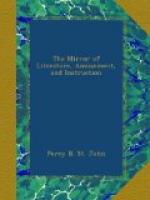It has been said that “there is a pleasure in being mad that none but madmen know;” but this only applies to that species of madness which is produced by an excess of imagination eventually overpowering the judgment.
The insincerity of a friend has often inclined men to seek for a surer reliance upon money; these unexpected shocks make us disgusted with our species, and it is for this reason that old men who have seen so much of the world become at last avaricious.
The only result an inquirer after truth can derive from metaphysics will be to find himself silenced for the present; they rarely convince, and for the most part mislead.
All the discoveries made within the last century were ridiculed and treated with contempt by our forefathers; yet we are equally prejudiced and hostile to all those improvements proposed to us, which will in all probability be adopted by our children.
All those animals who are associated with man become immediately participants in his misery: when once domesticated they become liable to disease, whereas in a wild state they could have perished only from age or accident.
If we subtract from the twenty-four hours the time spent in eating, sleeping, exercise, and the other indispensable cares of our existence, what a fraction of time is employed on our intellectual faculties! Again, there are few who have the means to enable them to study; fewer the talent requisite; and still fewer the inclination, if they have the ability.
The force of habit affects even our palates; we in time acquire a relish for what was once perfectly nauseous. The Greenlander detests turtle soup as much as we abominate train oil.
Courage, or a contempt of danger, is a mere animal quality, and being only the result of a particular formation, is entitled to no merit, though it may demand our applause: but moral, or acquired courage, is a very different thing. A man who is fortunate in the world and has a sacrifice to make, if he conducts himself with spirit, is also more entitled to our admiration than a mere desperado.
F.
* * * * *
HAMET AND RASCHID.
AN EASTERN TALE, VERSIFIED.[1]
The sultry sun had gain’d the middle
sky,
Reigning above in cloudless majesty,
When deep engag’d in pray’r,
two neighbouring swains
Knelt where the common bound divides their
plains.
Hamet and Raschid;—whilst their
flocks around
Panting with thirst, or dying, strew the
ground,
With hands uplift they beg their god in
pray’r,
Themselves to pity, and their flocks to
spare.
Sudden the air grew calm, no zephyr stirr’d,
Through all the valley not a sound was
heard,
That instant hush’d was all the
vocal grove,
And sounds aerial warbled from above:
Around each shepherd cast his wond’ring
eye,
And down the vale was seen advancing nigh,
A mighty Being, whom when near he stood,
They knew that Genius who distributes
good;
The sheaves of plenty in his hand they
see,
In that the avenging sword of misery.




